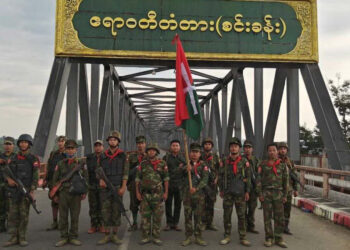DHAKA — A joint Bangladesh-Myanmar working group on repatriation will visit Myanmar’s Rakhine State in August to assess whether conditions are suitable for the safe return of Rohingya refugees, a Bangladeshi official said.
The visit will be its first since militant attacks on police posts in Rakhine on Aug. 25 triggered a crackdown by the Myanmar military that has driven some 700,000 mostly Rohingya to Bangladesh.
“We want to see what they [Myanmar] have done to create a conducive environment, what kind of houses they have built, what they have done for their business and land…. We will return with a briefing so that we can say what kind of work has been done, whether or not it is enough, if a conducive environment is being created,” Foreign Secretary M Shahidul Haque told reporters at an event in Dhaka on Tuesday.
The public discussion, titled “The Rohingya Influx and its Impact on Locality: The role of stakeholders for durable solutions,” was organized by the National Human Rights Commission with funding from the United Nations Development Program.
Bangladesh and Myanmar formed the 30-member joint working group in December to supervise all aspects of the repatriation of refugees from Myanmar back to Rakhine.
The group held its second meeting in Bangladesh in mid-May, co-chaired by Shahidul Haque and Myanmar Foreign Affairs Ministry Permanent Secretary U Myint Thy.
At the meeting, Bangladesh insisted that Myanmar create a conducive environment for repatriation by taking certain steps, including ensuring Rohingyas’ rights to property and freedom of movement.
According to the UN’s ReliefWeb, Myanmar reiterated its readiness to receive Rohingya who were verifiably displaced from Rakhine and urged Bangladesh to start sending back the roughly 2,300 volunteer refugees Naypyitaw has already screened and approved.
Myanmar in turn asked Bangladesh to provide information on its readiness to commence the repatriation process, including transit camps on its side of the border and efforts to educate the refugees about the repatriation process.
Myanmar also called on the international community to help bring a stable peace and sustainable development to all of Rakhine State’s residents.
The working group is scheduled to hold its next meeting in Naypyitaw.
Shahidul Haque said the joint visit to Rakhine would probably last two or three days and begin on Aug. 9 or 10. He added that Bangladesh Foreign Minister Abul Hassan Mahood Ali would join the trip.
“With this process we will be able to repatriate them safely and securely,” the foreign secretary said, adding that repatriation was a very complicated process but that Myanmar and Bangladesh were progressing relatively quickly.
Shahidul Haque declined to give a clear answer when asked why none of the refugees has been repatriated through official channels to date. “We have to be optimistic,” he said.
In addition to the bilateral repatriation agreements Bangladesh and Myanmar have signed with each other, the UN recently signed deals with both to help facilitate the returns.
Imtiaz Ahmed, director of Dhaka University’s Center for Genocide Studies, told The Irrawaddy that the working group should be taking a long-term view of the repatriation process and consider how safe the Rohingya refugees will be after they return. He said Myanmar should also amend its laws to guarantee them a path to citizenship.

















